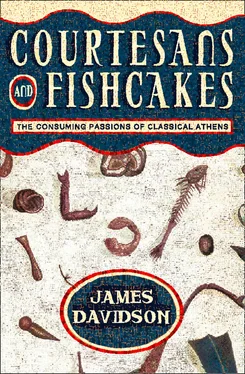Reading these fragments we can get some idea of the extraordinary power their passion for fish exercised over the Athenians. Fish are treated as quite irresistible, lusted after with a desire that comes close to a sexual one. The strength of this Athenian appetite is demonstrated most graphically by passages in which fish are involved in a literal or metaphorical seduction. Anaxandrides’ play Odysseus , for instance, contains the following eulogy of the fisherman’s art:
What other craft gets youthful lips burning, gets their fingers fumbling, has their lungs gasping for air, in their haste to swallow? And isn’t it only when it’s well-supplied with fish that the agora brings about liaisons? For what mortal gets a dinner-date if all he finds for sale when he gets to the counter are fish-fingers, crow-fish, or a picarel? And when it comes to seducing a real beauty, with what magic words, with what chat-up lines would you overcome his defences if you take away the fisherman’s art? For his is the craft that conquers with stargazy pie’s overwhelming eyes, that draws up lunch’s (arsenal?) to undermine the defences corporal(?), his, the expertise that gets the free-loader to recline, unable to decline to pay his way.
The anecdotalist Lynceus of Samos even suggested, a little mischievously, that it was for the sake of a fish from Rhodes (the famous dogfish, of course) that the Athenian hero Theseus yielded his favours to Tlepolemus, the island’s mythical founding father. In a later period there is evidence that the influence exercised by fish in the processes of seduction was thought to reveal some occult power. Apuleius, author of the Golden Ass , had to defend himself from a charge of casting a love-spell over his rich and aged wife with the magical assistance of fish purchased in the market. There is little evidence for this supernatural connection in the classical period, although because of her triple-sounding name, the red-mullet, or trigle , was associated with the triple-faced patron of witches and guardian of road junctions, Hecate. On the other hand, fish are sometimes found used as love-gifts in Attic vase-painting. One depicts a young man and his attendant approaching a hetaera spinning wool, with gifts of an octopus and two birds. Another vase, once in Leningrad, now lost, had a boy seated and wrapped in a cloak being offered a hoop and a large fish by a winged Cupid. 10 Конец ознакомительного фрагмента. Текст предоставлен ООО «ЛитРес». Прочитайте эту книгу целиком, купив полную легальную версию на ЛитРес. Безопасно оплатить книгу можно банковской картой Visa, MasterCard, Maestro, со счета мобильного телефона, с платежного терминала, в салоне МТС или Связной, через PayPal, WebMoney, Яндекс.Деньги, QIWI Кошелек, бонусными картами или другим удобным Вам способом.
It is not just their tastiness that connects fish to seduction, but also the way they look. The two sisters popularly known as the ‘anchovies’ mentioned in a speech of Hyperides were apparently so named because of their ‘pale complexions, slender figures and large eyes’. And so, by way of a startling metaphorical transition from appetizement to seduction, fish come to be represented themselves as coquettish flirts and paramours. The conflation of images is found fully developed in a fragment of Diphilus’ comedy The Merchant . The speaker complains about the high price asked for the fish: ‘nevertheless, if one of them ever smiled at me, I would pay, albeit with a groan, all that the fishmonger asked of me.’ This representation, which sounds so extraordinary to our ears, of fish as seductive bodies comparable in some way to the beautiful boys and hetaeras they helped to seduce, is what lies behind the common trope in which the eel, typically ‘appareled’ in beet (perhaps, most feasibly, beet-leaves), is compared to a nubile woman or a gorgeous goddess. When Dicaeopolis, the hero of Aristophanes’ Acharnians , learns that the Boeotian smuggler has fifty ‘Copaic maidens’ in his sack, he goes into raptures: ‘O my sweetest, my long-awaited desire.’ In the Peace , someone imagines the reaction of Melanthius, a certain fish-loving tragedian, arriving at the fish-stalls too late for the eels: ‘Woe is me, woe is me,’ he cries, launching into a spoof soliloquy excerpted from a climactic scene of his own Medea , ‘bereaved of my darling in beet-bed confined.’ It could be suggested that such extraordinary metaphors are only to be expected in comic discourse, with its fondness for startling and jarring images, but the practice of comparing women to mouth-watering fish and fish to women seems to have been rather more general in Athenian society. Apart from the anchovy sisters mentioned above, we find flute-girls and hetaeras given nicknames like ‘Sand-smelt’, ‘Red Mullet’ and ‘Cuttlefish’, a practice exploited to full comic effect by the poet Antiphanes in his play She Goes Fishing , where he plays on this double-meaning of the names of fish, so that it is hard to know at any one time whether he is satirizing his victims for their love of fish or for their excessive devotion to hetaeras and boys. 11 Конец ознакомительного фрагмента. Текст предоставлен ООО «ЛитРес». Прочитайте эту книгу целиком, купив полную легальную версию на ЛитРес. Безопасно оплатить книгу можно банковской картой Visa, MasterCard, Maestro, со счета мобильного телефона, с платежного терминала, в салоне МТС или Связной, через PayPal, WebMoney, Яндекс.Деньги, QIWI Кошелек, бонусными картами или другим удобным Вам способом.
Fish seduces and conquers. It functions like the forces of persuasion, or the allure of a hetaera, or the magical power of charms. Comic authors made use of this notion of piscine irresistibility to create spoof imprecations and oaths. In Aristophanes’ Knights the Sausage-seller curses the Paphlagonian (a thinly disguised caricature of the demagogue Cleon), his rival for the favours of old Demos (i.e. the people), in the following terms:
I will not make threats, but I do offer the following prayer: May your sizzling skillet of squid be standing by. And may you be about to make a speech on the Milesian business and turn a talent in bribes if you get the job done. And may you hurry to get the calamary down in time for going to the Assembly. And may the man come for you before you have time to eat. And, in your eagerness to get the talent, may you choke to death with your mouth full.
In his Acharnians a similar malediction is invoked against a rival playwright; this time the longed-for squid is pictured sailing slowly and tantalizingly towards the accursed and putting ashore on the table beside him only to be snatched away at the last minute by a dog. Antiphanes even uses the irresistibility of fish to a fish-lover in an oath: ‘I’d as soon give up my purpose as Callimedon would give up the head of a grey-fish’, says one character in resolute defiance. It is perhaps not surprising that the Stoic Chrysippus, writing in the following century, preferred to refer to such people as opsomanes instead of opsophagos , meaning ‘fish-mad’, and comparing the man so afflicted to the gunaikomanes , mad about girls. 12 Конец ознакомительного фрагмента. Текст предоставлен ООО «ЛитРес». Прочитайте эту книгу целиком, купив полную легальную версию на ЛитРес. Безопасно оплатить книгу можно банковской картой Visa, MasterCard, Maestro, со счета мобильного телефона, с платежного терминала, в салоне МТС или Связной, через PayPal, WebMoney, Яндекс.Деньги, QIWI Кошелек, бонусными картами или другим удобным Вам способом.
Читать дальше












